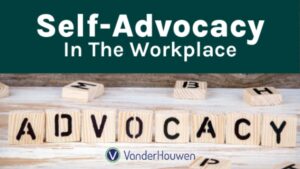How to Navigate Your Professional Development
Are you feeling stagnant in your career? Do you have your eyes on a promotion? Or, are you feeling like you’re falling behind because your industry is changing so quickly? Whether you’re looking to change your profession, advance your career, or develop new skills, carving out time for professional development is a must. But where do you begin? With so many options out there, navigating your own professional development can feel overwhelming. Don’t worry! Take a deep breath, relax, and get ready to take notes, because VanderHouwen’s here to help you along your professional development journey.
Define your professional development goals
The first step in creating a professional development plan is to define what you’d like to achieve. Start by writing down your goals. Perhaps you’re looking for a promotion at your current company, or maybe you’d like to change industries or careers completely. Your target might be to acquire new skillsets and build up your resumé, or maybe you’re working to be better informed about a topic in your current industry. Whatever your motivation, establishing goals will aid in mapping out the steps you need to take to get there.Formulate a professional development plan
Now that you’ve created goals, assess your current talents and experiences to determine what gaps you have and what skills you need to acquire to fulfill your objectives. For example, if you’d like to move up in your current company, take a look at the position requirements of your target job: How many of those skills do you already have? Does the position require a skill that you haven’t yet mastered? Write down a list of the experiences you need to succeed and draft a plan outlining where and how you will get them. Need strong presentation skills? Try a group like Toastmasters to flex your speaking muscles. Want to up your writing game? Schedule time each morning specifically dedicated to practicing your craft. Looking for hands-on development practice? Consider taking on a side project to gain valuable experience and confidence in that area. A solid game plan will help you stay motivated and focused on what you need to do to achieve your goal.Find a mentor to help you along your journey
While you may have an idea of how you’d like to grow, it can be hard to know how to get there. If this sounds like you, identify a mentor who could guide you through your options, help you define a process, and support you along the way. Reach out to someone who you admire, trust, and respect—this could be a current co-worker, a former colleague, someone you meet through a networking group or even a friend. Invite them to an informal get-together: Buy them a coffee, share your situation, and ask for their guidance. Take a leap of faith and put yourself out there—you’ll be surprised how many people are willing to help and how much they can contribute to your professional growth.Lean into learning and be a sponge
Once you’ve determined how you’d like to grow professionally, it’s time to take charge of your development plan! There are abundant professional and educational resources available at your fingertips, so research the opportunities that are best for you and will help fulfill your goals. Take an online course to acquire knowledge in your target area. Get certified on a topic to grow your skills. Carve out time weekly that is specifically dedicated to reading about the latest news in your industry. Join a networking group or meetups to connect with like-minded peers, garner inspiration, and create a network of support. Be curious, take initiative, and invest in yourself.Talk to your current employer about how they can support
Developing your skillset does not just benefit you, it also benefits for your employer. If your current employer doesn’t have a professional development plan or budget set aside for ongoing education, make a case as to why they should consider it. Demonstrate the ROI to show your boss how your training will pay off: What can they expect after sponsoring your attendance at a conference and how will you be able to apply new learnings to your current role? Ask for their support in putting you through an executive program and be sure to tie it back to how it will positively impact the organization. If your leadership team has reservations about allocating budget towards professional development, start with a smaller ask: Can you organize a brown bag lunch once a week at your company? Are they willing to let you set aside some “staying sharp” time each week for relevant webinars or readings? Will they support your attendance at a free certification program? Once you’re able to demonstrate how new learnings can help you in your role, you’re likely to get approval in the future for more company-sponsored professional development support.Track your professional development progress
Document your progress towards reaching your goals. Identify and record the microtasks that help you achieve your larger objective. For example, if your goal is to acquire new software development skills, make a list of all the tasks you need to do and check them off as you go. Include everything from setting up informational interviews to participating in a webinar, to attending a coding boot camp. Research shows that being diligent about checking off items on your list gives your brain a surge of dopamine, which in turn motivates you to continue moving forward. Plus, documenting your efforts can have benefits down the line. If you’re interviewing for a new position, you can refer back to your list to remind yourself of all that you’ve accomplished.Never stop learning
So how did you do? Were you able to get that promotion, meet a mentor, or just carve out a little more time each week towards research and reading? Keep up the positive momentum by continuing to set goals, network, and grow professionally. Industries and technologies are constantly changing, so it’s important to continue to prioritize your professional development and become a lifelong learner.Need some guidance on how to reach the next step in your career? Reach out to VanderHouwen.































































































































